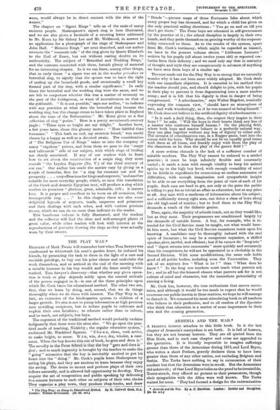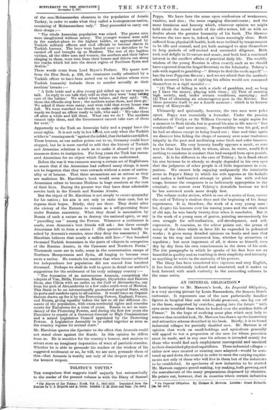ARMENIA AND THE WAR.*
A FEARFUL interest attaches to tide little book. In it the last chapter of Armenia's martyrdom is set forth. It is full of horrors, but they are not hearsay horrors. They are all quoted from the Blue Book, and in each case chapter and verse are appended to the quotation. It is literally impossible to imagine sufferings greater than those of the Armenians during 1915, and Lord 13ryce, who writes a short Preface, gravely declares them to have been greater than those of any other nation, not excluding Belgium and Serbia. The Turks have nothing to say in extenuation of their conduct but that the Armenians were in revolt. But the Armenians did not revolt; of that Lord Bryce believes the proof to be irresistible, Terror-struck, they offered no pretext to their persecutors, though their sympathies with the Allies were well known. The Turks waited for none. " Theyhad formed a design for the extermination • Ar•Miel and the War. By A. P. Hocoblko. • London: Hodder owl BkaglAcok 1,29. td. wt.)
of the non-Mohammedan elements in the population of Asiatic Turkey, in ordor to make what they called a homogeneous nation, consisting of Mohammedans only." They proceeded to carry out their design :- " The whole Armenian population was seized. The grown men were slaughtered without mercy. The younger women wore sold in the market.plaeo to the highest bidder, or appropriated by Turkish military officers and civil officials to become slaves m Turkish harems. Tho boys were handed over to dervishes to bo carried off and brought up as Muslims. The rest of the hapless victims, all the older men and women, the mothers and their babes clinging to them, were torn from their homes and driven out along the tracks which led into the desert region of Northern Syria and Arabia."
These words come from Lord Bryce's Preface. We quote now from the Blue Book, p. 359, the treatment coolly admitted by a Turkish officer to have been meted out to the babies whom even Turkish humanity forbade them to murder actually at their mothers' breasts :- " A little bride and a slim young girl sidled up to our wagon to talk. In reply to our talk they told us that they were busy raking care of the babies.' We asked what babies, and they said : 'Oh, those the effendis stop here ; the mothers nurse them, and then go.' We asked if there were many, and were told that every house was full. We were watched too closely to make calls possible. After- wards we found an officer ready to talk, who said : ' We take them off after a while and kill them. What can we do ? Tho mothers cannot take them, and the Government cannot take care of them for over.' " Apparently to the Turk an Armenian baby and a puppy have the some rights. It is not only in hot biked, not only when the Turkish soldier is " running amok "against the infidel, that the babies are killed. These horrors, as our author points out to us, Germany could have stopped, but he is most careful to add that the history of Turkish and Armenian relations is such as to make it absurd to put the massacre down to instigation. For long years the Turk has massa- cred Armenians for no object which Europe can understand.
Before the war it was common among a certain sot of Englishmen to assert that if the Armenians had suffered many things, it must not be forgotten that they were cowards without a sense of nation- ality or of honour. That these accusations are as untrue as they are malicious Mr. Hacobian's book would seem to prove. The Armenians refuse to become Moslems in huge numbers at the cost of their lives. During the present war they have done admirable service both in the French and Russian Armies.
But the object of Mr. Haeobian is not simply to create sympathy for his nation ; his aim is not only to state their case, but to express their hopes. Briefly, they are these. They desire after the victory of the Entente to remain as a self-governing State under Russian suzerainty. What they dread is annexation by Russia of such a nature as to destroy the national spirit, or any " parcelling out " among the Powers. Whenever a settlement is made, even Armenia's host friends will ask : Are there enough Armenians left to form a nation (The question can hardly be asked by Armenia's enemies, since they deny the massacres.) Mr. Hacobiau believes that nearly a million still live—" five hundred thousand Turkish Armenians in the parts of vilayets in occupation of the Russian Armies, in the Caucasus and Northern Persia." Thousands more are in exile, some in the concentration camps of Northern Mesopotamia and Syria, all longing to become once more a nation. He reminds his readers that when Greece achieved her independence her population did not exceed four hundred thousand. Perhaps wo shall do well to quote in detail our author's suggestions for the settlement of his truly unhappy country " The formation of an autonomous Armenia, comprising the vilayets of Van, Bitlis, Emoreum, Kharput, Diyarbakir and Eastern Sivas, also Cilicia with an outlet on the Gulf of Alexandretta, say from the port of Alexandretta to a few miles south-west of Messina. This State to be an internationally guaranteed neutral State, with its ports and markets open to all nations. It would have an Organic Statute drawn up for it by the Protecting Powers, England, France, and Russia, giving equality before the law to all the different ele- ments of the population, with extra-territorial rights and consular courts for Europeans for a term of years. Russia to act as man- datory of the Protecting Powers, and during the first few years the Executive to consist of a Governor-General or High Commissioner and a mixed Legislative Council appointed by the Protecting Powers. A Legislative Assembly to be called together as soon as the country regains its normal state."
Mr. Haeobian quotes the Spedator to the effect that Armenia could not stand alone against the Kurds. In this opinion he differs from us. Ho is sensitive for his country's honour, and anxious to rebutt oven an imaginary imputation of want of patriotic !domino. Whether he is able to persuade his readers of the wisdom of his . suggested settlement or no, he will, we are sure, persuade them of this—that Armenia is worthy not only of the deepest pity but of the keenest respect.















































 Previous page
Previous page